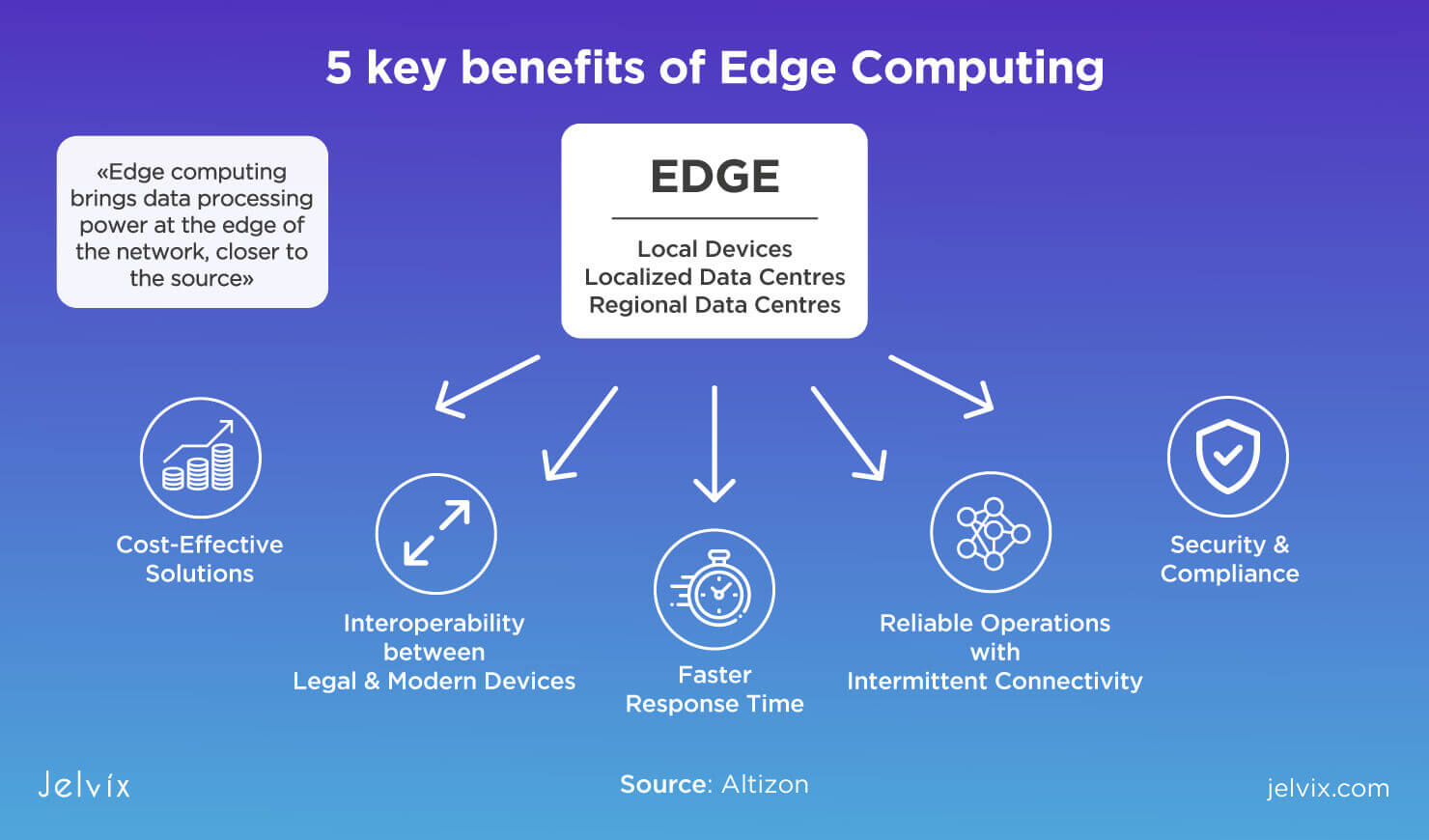benefits of mobile edge computing

#image_title
As we move deeper into the technological age, edge computing is increasingly becoming more popular with developers and companies alike. This technology involves processing, analyzing, and storing data closer to the source of its creation rather than relying on cloud-based solutions. It is a way to create a more efficient and faster network by decreasing latency and increasing data security and privacy.
Top 20 Software Development Trends for 2023
One of the most significant benefits of edge computing is its ability to reduce latency in data processing. The faster data can be processed, the faster a response can be provided leading to faster decision-making. This makes edge computing particularly beneficial in situations where real-time data processing is essential, such as autonomous vehicles, healthcare systems, and video games.

Another advantage of edge computing is its ability to process large amounts of data without putting too much strain on the network. This is particularly beneficial in situations where a large volume of data needs to be analyzed in real-time. With edge computing, the processing is done locally, reducing the amount of data that needs to be transmitted across the network. This results in fewer delays and faster response time.
As more businesses embrace this technology, developers working in edge computing will benefit from the increased demand for their skillset. With the demand for edge computing professionals predicted to continue growing over the years, individuals looking to work in this field are likely to benefit from an exciting and rewarding career.
What are the main benefits of Mobile Edge Computing
Mobile edge computing (MEC) is another area where edge computing has proven successful. MEC is a way to push computing power to the edge of the network, improving overall quality and speed while reducing the burden on the cloud. MEC can offer several benefits, such as reducing the amount of data transmitted across the network and decreasing latency in data processing.
In addition to these benefits, MEC can also provide increased privacy and security as data is processed and stored locally. This is especially important in situations where sensitive information such as health records or personal information needs to be safeguarded. MEC can also help to prevent data breaches as there is less data being transmitted across the network, which can reduce the risk of cyber-attacks.
MEC can also improve the performance of existing applications by allowing for faster data processing and improved response time. Applications that require real-time processing, such as virtual and augmented reality apps, can benefit greatly from MEC as it can provide the necessary computing power to process large amounts of data required for these applications in real-time.
Abstract
Edge computing is a rapidly growing technology that has many benefits in today’s world of big data. It allows data to be processed closer to the source, reducing the workload on the cloud while also improving response time and security. In this post, we highlighted some of the benefits of edge computing, such as reducing latency, improving network efficiency, and increasing privacy and security. We also looked at the benefits of mobile edge computing, which includes faster processing, reduced network strain, and improved app performance. With the growing demand for edge computing professionals, it’s an exciting time to work in this field.
Introduction
As technology continues to evolve, so too does the way we store and process data. In the past, companies relied on cloud-based solutions to store and process data. However, with the growth of big data, these solutions are no longer sufficient. Enter edge computing, a way to process, analyze, and store data closer to the source, resulting in faster response times and improved security.
Content
With edge computing, data is processed and analyzed closer to the source, which reduces latency and improves overall network efficiency. This is particularly beneficial in situations where real-time data is essential. For example, autonomous vehicles require instantaneous access to data in order to make decisions, and edge computing can provide that information without delays. Additionally, edge computing can also help process large amounts of data without putting unnecessary strain on the network.
The demand for edge computing professionals is predicted to continue growing. As technology continues to evolve, the growth of edge computing is expected to expand, resulting in more job opportunities for individuals looking for a career in this field. With a higher demand, individuals with edge computing skills and experience are expected to benefit from competitive salaries and various career opportunities.
Mobile edge computing (MEC) is another area where edge computing has shown great potential. MEC pushes computing power to the edge of the network, improving overall quality and speed while reducing the workload on the cloud. This results in faster data processing and reduced latency. Applications that require real-time processing, such as virtual and augmented reality apps, can greatly benefit from MEC.
Data privacy and security are major concerns in today’s society, and edge computing can help to improve both. As data is processed and stored locally, it is less exposed to cyber-attacks, and edge computing can also help to mitigate the risk of data breaches. This makes edge computing an attractive solution for businesses that deal with sensitive information such as healthcare providers and financial institutions. It also provides peace of mind for individuals concerned about the privacy of their personal information.
Conclusion
Edge computing is a promising technology that provides benefits such as reduced latency, improved security, and increased network efficiency. The demand for edge computing professionals is predicted to continue growing, providing individuals with valuable skills and experience numerous career opportunities. With mobile edge computing, applications receive a faster response time and improved performance. Finally, the data is processed and stored locally, providing increased privacy and security, which is essential in today’s society.

Source image : jelvix.com

Source image : nicolaswindpassinger.com


